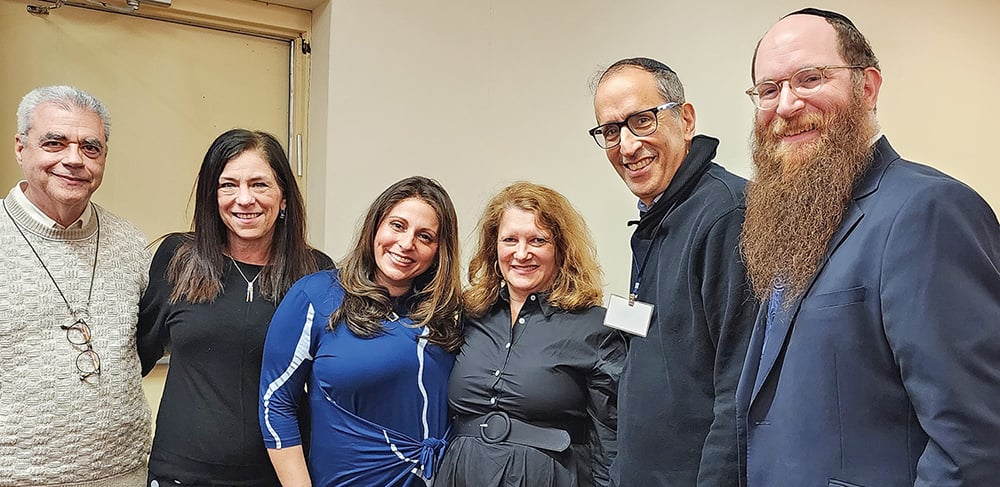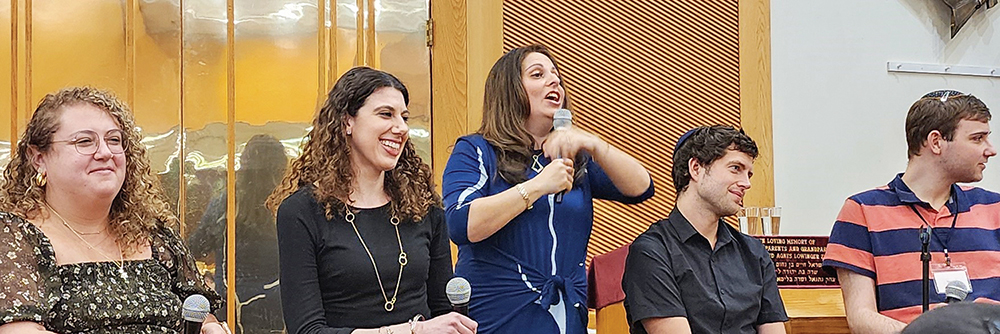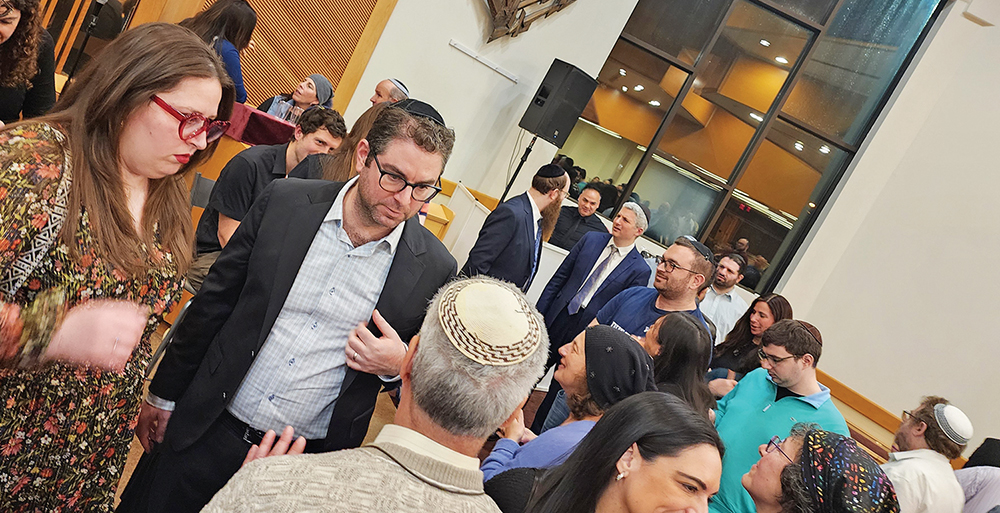
Nearly 200 people spent their Motzei Shabbat at Highland Park’s Congregation Ahavas Achim on March 3 to hear matchmaker Aleeza Ben Shalom and Rabbi Yisroel Bernath of the Netflix series “Jewish Matchmaking” share tips and strategies on “How To Get Married and Stay Married.” Ben Shalom entertained the audience in a three-act show that was followed by a melave malka. Nearly 100 singles had gathered in the community from the tri-state area and beyond for a shabbaton co-sponsored by Ahavas Achim, Ohav Emeth and Ohr Torah of the Highland Park/Edison area. The Saturday night activity included the presentation that acknowledged that as hard as it might be to “get married,” it can be even more challenging to “stay married.”
Ben Shalom’s entertaining presentation style captivated and engaged the audience during the first act as she related how she became a matchmaker, moved to Israel,and became a prominent feature on the Netflix show which follows her attempts at helping Jewish singles in the United States and Israel find love and get married. She moved to Israel during a period of required quarantine and immediately went to the Kotel as soon as she could. She felt it was a positive sign that she received notification from the show’s producers that she was the selected show host while in the Kotel area.
A native of Philadelphia, Ben Shimon grew up in a traditional Jewish home where she was instilled with the deep beliefs that she would “marry Jewish and love the land of Israel.” In her mid-20s she discovered that she appreciated Jewish observance and decided to take on keeping kosher, dressing modestly and observing Shabbat. A weekend retreat in Florida convinced her that Shabbat was the answer to everything. She ended the segment relating a custom that she and her husband have. Rather than saying “I love you,” they say, “I am loving you.” The distinction is that the act of love is a continual action where effort is made on any given day and continues forward into the future. It can be difficult to stay happily married, but the efforts are well worth it. The key to success in any stage of a relationship is to focus your interest and concern on the other member of the couple and less on always putting yourself first.

The second act consisted of Q & A with questions submitted by the audience. Some of the most interesting questions inquired how Jewish matchmaking has changed since October 7, whether matchmaking is an art or science, and how to handle
shidduch resumes or first dates if your resume is not completely spotless. According to the speakers, the events of October 7 reinforced the importance of Jewish family and continuity and matchmakers in Israel are busier than ever. The Netflix show introduced Jewish matchmaking to the world and Jews at all levels of religious observance are seeking help finding their “bashert.” Lay people and community members are also stepping up to help singles and make introductions.
While a certain amount of matchmaking relies on “art,” the science looks to build a relationship on some sort of commonality. Does the potential couple enjoy some of the same interests or hobbies? Are they on the same level religiously? The saying that “opposites attract” is not fully accurate; there has to be some basis of commonality on which to build a relationship. Not focusing on the negatives in your background does not mean to hide them completely from another person. Ben Shalom suggests mentioning them only at a point when it is probable that the relationship will move forward. Then any problematic areas can be critically examined before the “point of no return” when the couple has lost the ability to look at the information objectively. She also mentioned the California-based organization run by Jeremy and Ilana Hamburgh, My Best Social Life, that helps individuals who are autistic or neuro-divergent better navigate social interactions and build long-term relationships.
Four singles who had attended the shabbaton were selected from the group and brought on stage during the third act. They were introduced to the audience and answered questions in turn to allow the audience to get to know them. The two women and two men shared their thoughts about the type of person they hoped to meet, their pet peeves, what things would be deal breakers, and how far they would be willing to travel or relocate for a relationship. At the end of the segment, Ben Shalom asked how many people in the audience thought they might have a match for any of the group. Amazingly, 34 potential introductions and match ideas were identified and brought to the front of the room to be shared.

“This is such a wonderful program. And a tremendous mitzvah to help people find the right person with whom to continue their journey through life,” said Rabbi Eliyahu Kaufman of Congregation Ohav Emeth.
“Our community is proud to collaborate and host such an incredible event. What could be more important than celebrating and learning how to make matches and learn tips to make current relationships stronger,” added Rabbi Steven Miodownik of Ahavas Achim.
Everyone should think about people they know, consider their interests, and work to connect singles to someone who may be their bashert. Ben Shimon acknowledged that making a successful match is not actually a direct route to Gan Eden, but it is a way to bring happiness to other people.












